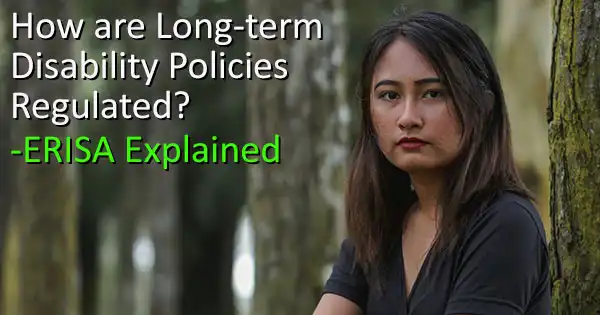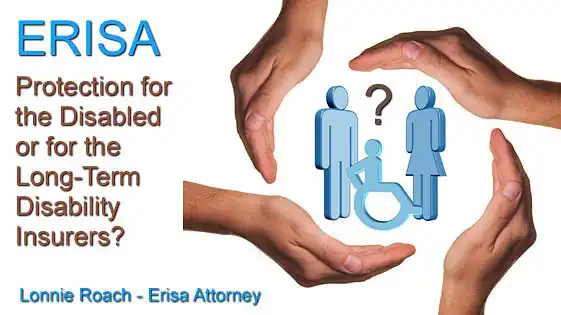How are Long-term Disability Policies Regulated? ERISA Explained
Author: Attorney Lonnie Roach
Updated: 1/27/2025
What You Need to Know About ERISA and LTD Policies.
Long-term disability policy’s that are obtained from an employer are regulated by federal ERISA Law.
This was done to try to help protect the consumer from unfair practices by the insurance companies, but often does just the opposite. Insurance companies may employ a variety of tactics to deny or reduce the amount of benefits, and to protect yourself is it advisable to consult a dedicated ERISA lawyer if you have been denied benefits.
How are Long-term Disability Policies Regulated?
If you cannot work due to an illness or injury, long-term disability insurance (LTD) can provide approximately 50% – 60% of your salary while you are disabled. LTD policies vary in their terms and conditions, but perhaps the most important difference is that while long-term disability insurance may be purchased individually through an insurance company, most LTD plans are sponsored by an employer.

WHAT DOES ERISA STAND FOR?
The Employee Retirement Income Security Act of 1974.
Most states have laws which punish insurance companies when they engage in unfair settlement practices and insurance bad faith.
These laws were designed to protect consumers from an insurance company’s wrongful denial of a claim.
Unfortunately, most people with long term disability insurance plans whose benefits were either wrongfully denied at the beginning or were cut off later on find that their state’s laws pertaining to insurance bad faith and unfair claims practices do not apply to the long term disability insurance carrier.
Most people obtain their long term disability benefits from their employer and as a result the disability insurance plan is considered an employee benefit plan regulated by federal law.
The federal law which regulates employee benefit plans is the Employee Retirement Income Security Act (ERISA). ERISA was enacted with the primary purpose of establishing uniform standards to be applied to employee benefit plans, including disability plans provided by employers. Many employer benefit plans cover employees in several states and having to comply with each state’s regulations was thought to be too difficult for the plan administrators. It was thought that having a uniform set of federal regulations would not only ease these burdens, but would also give consumers uniform rights.
Why is ERISA important?
ERISA law was intended by its sponsors to ensure that pension plans were managed responsibly, so that employees would actually receive the benefits they were expecting.
They wanted to restrict shady investment practices and increase the transparency of plan management. The law was later interpreted to apply to health and disability benefits plans.
How is ERISA law harmful?
Unfortunately, the application of ERISA law to long term disability insurance plans has reduced rather than expanded the legal protections available to policyholders.
It left the field wide open for insurance companies to implement a claims policy that is best described as, “When in doubt, deny the claim.”
ERISA law permits the long term disability insurance plan administrator to decide if a claimant is disabled, using the language of the insurance policy and the medical evidence in the claims file.
Claimants must exhaust the 180-day appeals process prescribed by the ERISA statute before they can file a lawsuit to obtain benefits. To make matters worse, the courts will usually assume that the plan administrator has made a reasonable decision unless it has acted in an arbitrary or capricious manner.
It is not unusual for an ERISA plan administrator to deny disability benefits based on one dissenting opinion from a doctor or nurse chosen by the long term disability insurance company.
This can happen even if the doctor or nurse is not a specialist, or is less qualified in that medical specialty than the patient’s own doctor.
How is ERISA law helpful?
In spite of these legal obstacles, those disabled from working can be protected under existing law.
Under ERISA, employees must be notified of benefit plan terms including funding, coverage, costs, and protection from financial wrongdoing. Plan participants have a right to sue if a plan is mismanaged. ERISA requires each plan to notify participants in writing about how to file a claim and must notify participants of significant changes to any plan. Participants must be informed of the requirements they must meet for benefits to vest; for example, how quickly they must file a claim when injured in order to be covered. ERISA also protects employees from wrongdoing by plan administrators. If a plan loses money because of mismanagement, a plan administrator may be personally liable to restore the loss.
ERISA standards include:
- Providing employees with facts about health and retirement plans
- Reporting guidelines
- Document filing guidelines
- Fiduciary responsibilities
- Complaint and appeals processes
- Creating trust accounts for plan assets
- The right to sue for breach of fiduciary duty
Know your plans definition of Disability
If you are unable to work because of an illness or injury and have an LTD policy, you may be eligible for benefits to replace some lost income.
However, getting a claim approved by an insurance company may not be easy. Before filing a claim, you should know the definition of “disability” as stated in your LTD policy, as well as the amount of time you must wait before receiving benefits, called the “elimination period” (usually 90 – 180 days).
What do LTD companies do to deny claims?
Insurance companies employ a variety of tactics to deny or reduce the amount of benefits:
- An insurance company may refuse to give you a copy of your insurance policy and insist the policy must be obtained from your employer.
- An insurance company will employ their own medical providers to review medical claims resulting in biased decisions.
- An insurance company will review social media or hire an investigator to find any evidence to prove you are not disabled and deny your claim.
- After two years, when a policy usually converts to “any occupation” from “own occupation” an insurance company will hire a vocational consultant to review your training, education and work experience. These consultants are almost always employed by the insurance company and likely to determine a claimant can perform some type of work.
The insurance company or its plan administrator decides to approve or deny a claim.
If a claim is denied, the claimant can file an internal appeal. If the appeal is denied and all internal appeal processes have been exhausted, only then can a claimant file suit in federal court. A federal judge will review the case and base their decision on the administrative record – all the evidence and medical records in the claimant’s file up to that point. Once a case goes to federal court, no new evidence can be added or considered in the matter.
Why should I consult an attorney if I have an LTD claim?
Because ERISA has specific procedures and deadlines to follow when filing a claim, a long-term disability attorney experienced in ERISA matters should be consulted as soon as a claimant becomes disabled.
If an LTD claim is denied, an attorney is absolutely necessary to prepare an appeal; an ineffective or untimely appeal may result in a lost opportunity to pursue the claim in court. If a case proceeds to trial, the skills of an appellate attorney will be needed.
Do I need to have a local lawyer?
No, insurance attorneys with specialized knowledge in ERISA law and long term disability insurance law are far more likely to obtain the maximum Social Security disability and other disability benefits than a local lawyer without the same experience.
Our clients find it very convenient to work with us by telephone and e-mail on a regular basis.
If you have been denied disability benefits, you can raise your odds of prevailing by working with a skilled attorney like the insurance attorneys at the disability law firm of Bemis, Roach & Reed. Our law firm’s office is located in Austin, Texas; we represent individuals throughout the State of Texas helping them obtain and recover their needed long term disability and social security disability benefits.
Is it possible that the insurance company will have to pay my attorney fees?
If your case goes to trial and you prevail, a court can make an award of attorney’s fees.
Remember, different parts of the country have different rules as to grants of attorney’s fees. It is also possible to obtain an allowance for such fees in mediation, though that amount is generally incorporated in a “lump sum” settlement.
If I file a lawsuit how long can this take?
The reality is that most long term disability cases settle, but every case is different.
Cases that settle may take 6-12 months, depending on where you are in the appeals process. If the case goes to trial, expect the matter to take more than 12 months, especially if there is an appeal to the Circuit courts.
Bemis, Roach & Reed has successfully handled cases against the following insurance companies:
- Aetna
- Cigna
- Connecticut General Life
- Hartford
- Life Insurance Co. of North America
- Lincoln Financial
- Northwestern Mutual
- Provident
- Reliance
- Unum
- Assurant
- CNA
- Fortis
- Liberty Mutual
- Life Insurance Co. of New York
- Metlife
- Paul Revere
- Prudential
- Standard
- Unum Provident
Lonnie Roach is Board Certified in Personal Injury law and an authority in ERISA cases.
Having published several opinions concerning LTD law which are used to determine how ERISA claims are decided, he is considered one of the top attorneys in ERISA law in the state of Texas. Many of Mr. Roach’s clients are referrals from other attorneys, who, knowing the complexity of ERISA want to do what is best for their clients and confidently send them to Bemis, Roach & Reed. Mr. Roach is admitted to the United States District Courts for the Northern District of Texas, the Southern District of Texas, the Eastern District of Texas, and the Western District of Texas, as well as the United States Court of Appeals for the Fifth Circuit. Mr. Roach successfully overturned denials of disability benefits at trial in U.S. District Court and the United States Court of Appeals. Lonnie Roach will consult with you as soon as soon as you become disabled and help you avoid common mistakes.
Disability Insurance & Erisa Law Explained
“My partner, Lonnie Roach, is probably the preeminent ERISA lawyer in the state of Texas. It is an extremely complicated, very difficult practice area. It’s only in federal court, and by the way, our law firm is licensed in every federal district in the state of Texas, so we have a statewide ERISA practice.”
– Greg Reed

Your Free Initial Consultation
Call now:
At Bemis, Roach and Reed, if we can't help you, we will try to find the right attorneys for you.
We offer each of our prospective clients a free no obligation one hour phone or office consultation to see if we can help you and if you are comfortable with us. We know how difficult a time like this can be and how hard the decisions are. If we can be of assistance to you and help you find a solution to your issue we will, even if that means referring you to another attorney.
Let's get you Started:
If you could provide us with some basic information about your claim we will get right back with you with a free case evaluation and schedule your Free Consultation Today.
You can also email us at: contact@brrlaw.com
Disability benefits are an important source of income for those who are unable to work. If you are not able to work due to accident or illness, you may be eligible for Social Security Disability or Long Term Disability benefits. If you have applied for benefits and been denied, contact the attorneys at Bemis, Roach and Reed for a free consultation. Call 512-454-4000 and get help NOW.

Kind Words from Our Clients
“The attorneys and staff at Bemis, Roach & Reed have provided me and my husband, Jeff, with stellar advice, care, and service. They made navigating the SSDI process easy, painless, and as timely as possible. During this difficult time in our lives it was a tremendous relief to know they were on our side and keeping us updated on next steps and timelines. We also had questions about my husband’s long term disability insurance and they helped us get those questions answered and resolved without any additional fee. I highly recommend Bemis, Roach & Reed.” – Kelli G
“I needed a lawyer for my case and had googled best lawyers. They came up first on my list and decided to give them a call. From the moment I called I knew I chose the right people. They said they would fight for me and fight they did. They knew what they were doing and kept good communication throughout the process. If you need someone that will listen, understand, and fight then these are the people. HIGHLY RECOMMEND.” – Marcel L.
“I’ve had a great experience working with Bemis, Roach & Reed for my disability case. I spent two years fighting on my own, until I was informed to look for a disability lawyer. Right away, sending in questions was a breeze, and from the moment my case was accepted, everything became a major weight off my shoulders. My newest appeal was filed for me, my medical records and case history sorted for me, and I could finally focus on my appointments and treatment with a little less worry. Everything was explained to me in a way that made sense, the process was set out in an easy to understand way. And, just like that, at the beginning of July 2023, my claim was accepted!” – Sunshinemutt





